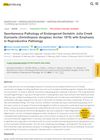August 2022 in “Metabolic Brain Disease” Ferulic acid may help control menstrual cycle-related epilepsy by affecting female hormones.
 50 citations,
May 2020 in “Journal of Clinical Medicine”
50 citations,
May 2020 in “Journal of Clinical Medicine” Non-binary transgender individuals need personalized hormonal treatments for better well-being and quality of life.
 November 2023 in “The journal of investigative dermatology/Journal of investigative dermatology”
November 2023 in “The journal of investigative dermatology/Journal of investigative dermatology” Early treatment and multidisciplinary care are key to managing Frontal Fibrosing Alopecia and preventing further hair loss.
 March 2024 in “International journal of pharmaceutical sciences and drug research”
March 2024 in “International journal of pharmaceutical sciences and drug research” Androgenetic alopecia is influenced by various factors and can be treated with medications, procedures, and non-drug methods.
 1 citations,
September 2018 in “European Journal of Cancer Prevention”
1 citations,
September 2018 in “European Journal of Cancer Prevention”  1 citations,
July 2023 in “Frontiers in Immunology”
1 citations,
July 2023 in “Frontiers in Immunology” Oxidative stress and immune dysfunction are linked to both Hashimoto's thyroiditis and polycystic ovary syndrome, with diet and specific treatments important for managing these conditions.
 90 citations,
May 2019 in “Drugs”
90 citations,
May 2019 in “Drugs” Long-term use of azole antifungals can cause hair loss, hormonal imbalances, and severe skin reactions.
 277 citations,
July 2011 in “Journal of the Dermatology Nurses’ Association”
277 citations,
July 2011 in “Journal of the Dermatology Nurses’ Association” The skin's layers protect, sense, and regulate the body's internal balance, but can be prone to cancer.
 18 citations,
April 2016 in “Endocrinology and Metabolism Clinics of North America”
18 citations,
April 2016 in “Endocrinology and Metabolism Clinics of North America” The document concludes that diagnosing PCOS in teenagers is difficult and should focus on specific hormone levels and menstrual irregularities, while also considering treatment for symptoms and related health issues.
110 citations,
January 1984 in “Progress in brain research” Gonadal hormones may influence sex differences in play fighting in animals, but their effect on human spatial behavior is unclear and needs more research.

Older Julia Creek dunnarts often have reproductive and hormonal health issues.
 January 2024 in “Journal of surgical case reports”
January 2024 in “Journal of surgical case reports” Removing an adrenal tumor can significantly reduce high androgen levels in postmenopausal women.
 13 citations,
March 2016 in “Progress in Transplantation”
13 citations,
March 2016 in “Progress in Transplantation” Healthcare providers need better understanding and cultural sensitivity to improve care for transgender patients with kidney failure needing transplants.
 December 2022 in “Cureus”
December 2022 in “Cureus” Adult women with acne in Iraq often have more severe symptoms and hormone-related issues than younger girls with acne.
98 citations,
November 2017 in “Elsevier eBooks” Male accessory sex glands in rats rarely develop tumors and respond to hormones.
 September 2023 in “Deleted Journal”
September 2023 in “Deleted Journal” Lifestyle changes improve reproductive function and hormonal balance in obese women with PCOS.
3 citations,
February 2015 in “Mechanisms of development” Hormones and stretching both needed for nipple area skin growth in mice.
 January 2022 in “IntechOpen eBooks”
January 2022 in “IntechOpen eBooks” Some lesser-known causes of PCOS include autoimmune issues, genetic mutations, and changes in the body's microbiome.
September 2021 in “GLOBAL JOURNAL FOR RESEARCH ANALYSIS” The hormonal contraceptive combination effectively reduces androgen excess and improves PCOS symptoms like acne, hair loss, and menstrual issues.
 5 citations,
January 2014 in “Postepy Dermatologii I Alergologii”
5 citations,
January 2014 in “Postepy Dermatologii I Alergologii” Hormonal treatments like birth control pills can improve acne in women with excess hair growth and hormone imbalances.
 24 citations,
January 2001 in “Dermatologic clinics”
24 citations,
January 2001 in “Dermatologic clinics” Hormonal therapy is a treatment option for acne, the only medical treatment for hirsutism, and the most promising for androgenetic alopecia.
 1 citations,
January 2020 in “Archives of Medical Research”
1 citations,
January 2020 in “Archives of Medical Research” Formononetin, found in red clover, may treat hair loss with fewer side effects.
 9 citations,
April 2015 in “Dermatologic Therapy”
9 citations,
April 2015 in “Dermatologic Therapy” Hormonal therapies, like flutamide and cyproterone acetate, are safe and effective for treating adult women's acne, especially those with hormone imbalance or resistant acne.
 1 citations,
January 2014 in “Springer eBooks”
1 citations,
January 2014 in “Springer eBooks” Adult acne is more common in women, often linked to hormones, and can be harder to treat.

COVID-19 may be linked to hair loss called Telogen Effluvium, affecting quality of life and self-esteem.
 47 citations,
December 2000 in “Archives of Dermatological Research”
47 citations,
December 2000 in “Archives of Dermatological Research” Androgens significantly affect female hair loss, and hormonal treatments may help.
 May 2017 in “bioRxiv (Cold Spring Harbor Laboratory)”
May 2017 in “bioRxiv (Cold Spring Harbor Laboratory)” The peach gene pCTG134 helps control the interaction between auxin and ethylene hormones during fruit ripening.
 December 2022 in “Rossiiskii Zhurnal Kozhnykh i Venericheskikh Boleznei”
December 2022 in “Rossiiskii Zhurnal Kozhnykh i Venericheskikh Boleznei” Androgenic alopecia in men is mainly linked to family history, hormonal imbalances, and metabolic issues, but can also be influenced by lifestyle habits, environmental factors, and deficiencies in certain vitamins and microelements like copper.
 2 citations,
February 2022 in “Journal of The American Academy of Dermatology”
2 citations,
February 2022 in “Journal of The American Academy of Dermatology” Hormonal intrauterine devices (IUDs) may cause or worsen skin conditions influenced by androgens.
 9 citations,
January 2016 in “Skin Pharmacology and Physiology”
9 citations,
January 2016 in “Skin Pharmacology and Physiology” The study concluded that both estrogen and androgen receptors, which decrease with age, are linked to skin aging and may be hormonally regulated.
























